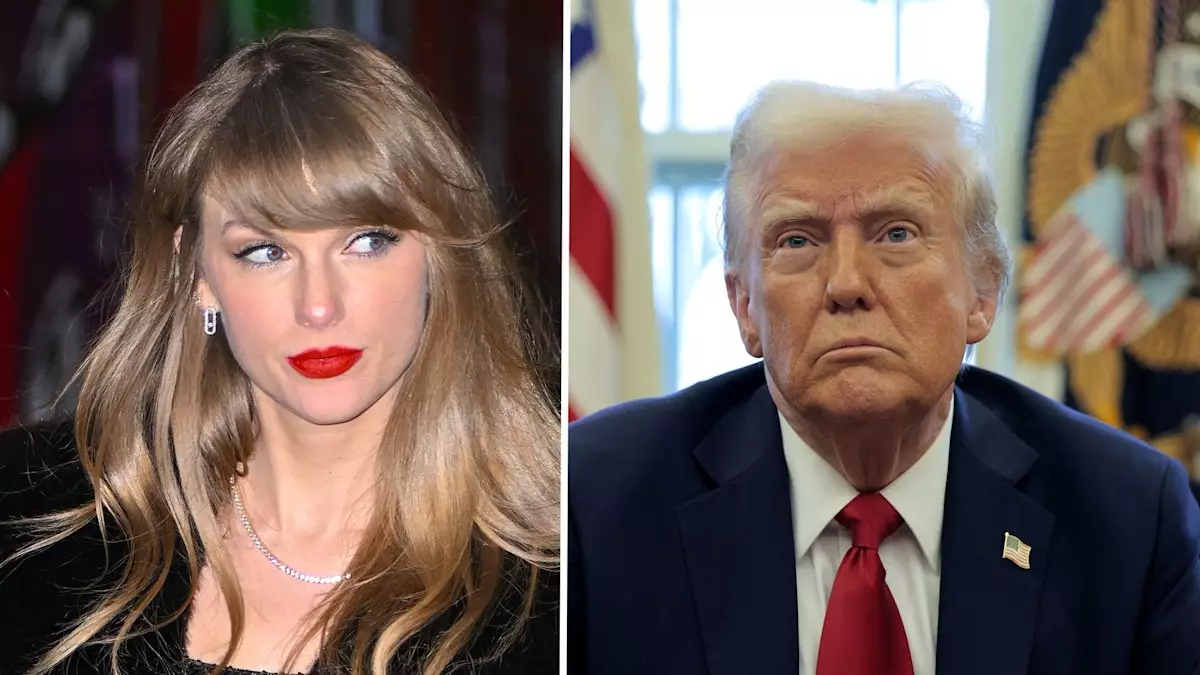In a bizarre twist of political theater, former President Donald Trump reignited his longstanding feud with pop icon Taylor Swift, using his platform on Truth Social to make caustic remarks about the singer’s appearance. In a post laden with disdain, he mused, “Has anyone noticed that, since I said ‘I HATE TAYLOR SWIFT,’ she’s no longer ‘HOT?’” Such comments seem perplexing not only for their lack of substance but also for their potential to distract from more pressing national issues. Instead of focusing on policies or the governance he once championed, Trump has opted for petty, personal jabs aimed at a woman who has become a vocal advocate for progressive values and political change.
This latest outburst is not an anomaly in Trump’s behavior. For years, he has directed his criticisms and insults toward celebs who declare their political affiliations publicly, often employing derogatory labels that serve only to alienate. Swift’s opposition to his administration was particularly scathing, especially during the 2020 election cycle when she openly declared her support for Democratic candidates. The irony lies in Trump’s strategy: when he lashes out at cultural icons, he only serves to elevate their platforms and reinforce their connections with younger, more progressive audiences.
Celebrity Politics: A New Era
The intersection of celebrity and politics provides fertile ground for controversy. Figures like Swift and Bruce Springsteen have leveraged their fame to challenge political norms and voice dissent against government actions. Springsteen’s remarks during a recent concert in Manchester, where he condemned the current administration as “corrupt” and “incompetent,” elicited condemnation from Trump, who belittled the singer as a “dried out ‘prune’” and decried his criticism from abroad. Trump’s comments not only reflect defensive behavior in the face of substantial criticism but signify a deeper discomfort with celebrities taking a political stance, particularly when that stance opposes his own.
Swift’s evolution into a political activist marks a significant departure from the traditionally apolitical personas of her pop superstar predecessors. She embodies a shift in the cultural landscape where artists feel compelled to engage in socio-political dialogues, shaping the opinions of millions. Her endorsement of Democratic candidates is both a reflection of her values and a calculated move aimed at galvanizing her fan base, particularly younger voters who are increasingly disenchanted with establishment politics. To grade her political involvement as harmful, as Trump insinuates, overlooks the powerful role of art in advocacy.
The Irony of Support
Complicating the narrative further is the fact that Trump’s own family harbors a fondness for Swift’s music. His daughter Ivanka and granddaughter Arabella are self-professed “Swifties,” even celebrating birthdays with Taylor-themed parties. This juxtaposition paints a fascinating picture of contradictions within Trump’s world: while he publicly rages against Swift, his family enjoys the very artistry he attempts to malign. Such divides illustrate the complexities of political affiliation and personal preference, exposing the inherent contradictions that permeate political discourse today.
If Trump perceives Swift as merely an overrated figure, he fails to recognize her substantial influence in shaping the political landscape. Her songs resonate with millions and often carry messages of empowerment, struggle, and resilience—a reality he seems both dismissive of and threatened by. The interesting facet of these celebrity attacks is that they often reveal more about the attacker than the assaulted, unmasking insecurities and a desperate grasp for relevance.
A Cultural Reflection
In sum, Trump’s feud with Swift serves as an engaging case study in contemporary American politics and cultural dynamics. It highlights the ways in which public figures navigate personal grievances, political opinions, and the responsibilities that come with their platforms. The engagement between these two worlds—celebrity culture and political discourse—opens up avenues for meaningful conversations about identity, influence, and the role of popular figures in advocacy and social change. As the lines between entertainment and politics continue to blur, one cannot help but reflect on the future of public discourse shaped by this unlikely rivalry.

